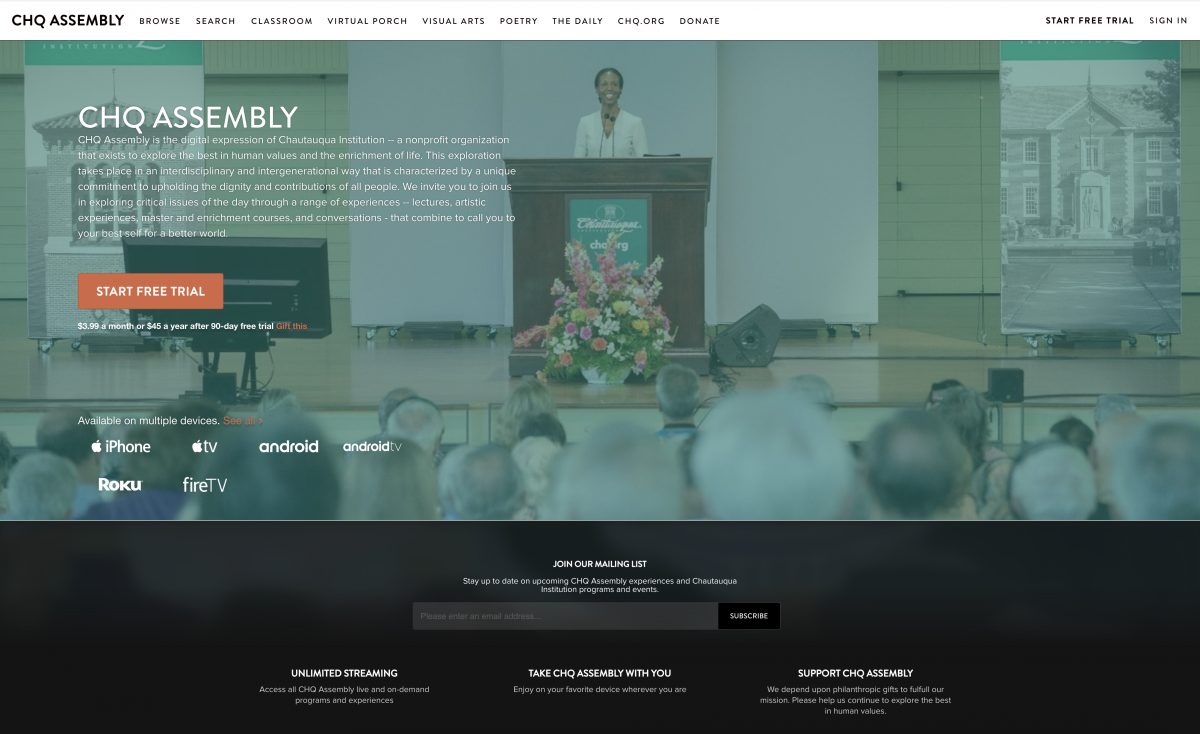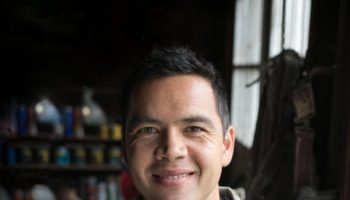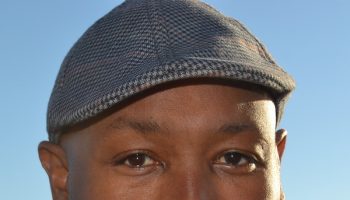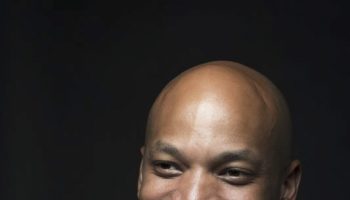Creating an online space for Chautauqua Institution’s programming to live beyond its summer seasons was always a part of Emily Morris’ 2020 plan. However, her timeline to complete it stretched as far as 18 months. With a newfound sense of urgency, community input and countless hours of work from Institution staff, the vision came to life in three.
“Having this time to focus on it and nothing else, because we can’t do much else, I think has ultimately been a gift to this initiative,” said Morris, vice president of marketing and communications and chief brand officer at Chautauqua Institution. “It is difficult to say anything that has been happening for the past four months is a gift. Perhaps this is our silving lining.”
Objective Two in the Institution’s strategic plan, 150 Forward, adopted last spring, called for expanding “Chautauqua’s convening authority year-round to broaden its impact beyond the summer assembly season.” That included, in 150 Forward, “developing platforms and venues to build upon and fully leverage summer assembly content,” among other areas of focus. On May 1, the Chautauqua Institution Board of Trustees unanimously decided to suspend any in-person programs on the grounds for the 2020 season. That, coupled with the directive in 150 Forward, meant the thousands of events that staff had spent nine months planning had to be moved online, or moved aside, in a matter of weeks. The result is CHQ Assembly.
CHQ Assembly, the digital expression of the Institution, is composed of five “digital properties” where video content, online conversations, master and enrichment classes, and virtual experiences will be presented for the 2020 season. The properties can be accessed from desktop, mobile and TV streaming devices and were designed to serve as a place to “share content, engage, learn, and experience the arts,” Morris said.
“The themes of the properties are interconnected, while also embodying the meaning of ‘assembly’ completely, creating an assembly of digital products that can serve as a proxy for the experience that we might have on the grounds under normal conditions,” Morris said.
Video Platform
The CHQ Assembly Video Platform, or “the hub,” as staff have been calling it, is where Chautauquans will find live and recorded lectures, performances and sermons.
For the 10:45 a.m. EDT Chautauqua Lecture Series, Matt Ewalt, vice president and Emily and Richard Smucker Chair for Education, said weekly themes such as “The Ethics of Tech: Scientific, Corporate and Personal Responsibility,” “Rebuilding Public Education” and “The Science of Us,” have new “focus and urgency during these times.”
“In conversations with our speakers, we are very much thinking together on how to pivot the conversation when necessary, or to put issues within the context of COVID-19 or demonstrations around the country calling for our collective efforts to end systemic racism,” Ewalt said.
From a production standpoint, Ewalt said he recognized the need to pre-record lectures when possible to ensure they are uninterrupted by internet issues or other complications. Lectures, some with a conversation format, will be delivered live at 10:45 a.m EDT. Lectures will also include a live, interactive Q-and-A period.
“With a few exceptions, most of our speakers have been enthusiastic to participate in 2020’s CHQ Assembly, particularly with our focus on community dialogue, recognizing the urgency of these conversations and that, in pursuit of our mission, Chautauqua could not go silent this summer,” Ewalt said.
Maureen Rovegno, director of the Department of Religion, said the Interfaith Lecture Series are being pre-recorded “as late as possible” to guarantee the conversation “includes all parts of the moment we’re in.”
“It is not only appropriate, it is critical that we have our speakers address the current issues facing our world,” Rovegno said. “The issues are painful, but they are transforming. Our lecturers have their fingers on the pulse of what our society has needed even before the current context evolved.”
Each lecture will begin with a video introduction from Rovegno or Gene Robinson, vice president of religion and senior pastor. After the pre-recorded lecture plays, Rovegno or Robinson will lead a live Q-and-A session with the speaker. Every scheduled Interfaith Lecture Series speaker agreed to participate in the virtual adaptation.
Selected lectures from previous seasons will also be available for viewing, including some previously unreleased content, according to Morris.
Logistically, Morris was concerned a digital platform would not support a parallel expression of the arts. Vice President of Performing and Visual Arts Deborah Sunya Moore said with the addition of “personal and educational conversations,” it will flourish.
“It is so easy to think about everything we cannot do this summer because we can’t be live, playing music,” Moore said. “When we go online, what is it that we can do online that we cannot easily do live? What we can easily do online is shorten the concerts and leave room for conversation where we can let everybody engage almost directly with the artist.”
Virtual Porch
The next property is the Virtual Porch, which will house space for engagement and conversation. These conversations will take place daily and, just as they would on the grounds, there will be several conversations taking place on multiple porches simultaneously. There is no fee for attending Virtual Porch events and no limit to the number of events in which one can participate.
According to Morris, the Virtual Porch has already sparked new conversations. On Saturday mornings, starting July 4, Ewalt, Moore and Robinson will join for “Coffee and Conversations” to go over the highlights and takeaways from the past week’s theme and programs.
“These conversations will allow us to examine the interconnectedness that we may not have seen as it was happening, but can connect now that it has happened,” Morris said. “We can also learn what this work we just accomplished calls us to do moving forward. We haven’t had this opportunity before, because we simply didn’t have the time.”
Online Classroom
Next is the Online Classroom. According to Morris, this is where Chautauqua’s Special Studies will be “reinvented.” These master and enrichment classes will allow for a deeper dive into theme-related topics each week and are designed to broaden “general knowledge and creative abilities.” Anyone can browse the online classroom catalog at any time, but an account is required to register for a class.
Giving credit where credit is due, Morris said Chautauqua’s Department of Information Technology led a bulk of this particular project, along with Karen Schiavone, manager of community education.
“They were building an online classroom at a time when people were having absolutely horrible online learning experiences because they were forced into them,” Morris said. “It was important that our team found a system that was not only seamless and easy, but also enriching.”
After sorting through dozens of choices, a learning management system for the Online Classroom was selected and implemented in just 40 days. Morris said that number is “symbolic.”
“Some really important things, at least in Christian biblical history, happened in 40 days,” she said. “I think that was God’s way of reminding us that there was some divine intervention in this massive undertaking.”
Chautauqua Visual Arts and Poetry Makerspace
Following the classroom is Chautauqua Visual Arts. This space will offer programs from the School of Art, as well as online gallery tours, exhibitions and an online gallery store. Last is the Poetry Makerspace, where the literary arts will continue to “innovate through the invitational art of poetry.”
“It is always going to be the most wholesome in the summer months when we are running the summer assembly and have all of those wonderful programs to share,” Morris said. “Just like any other TV series that you watch, there is a seasonality to them. CHQ Assembly will have that seasonality, but it will have a life all year round.”
Because it is so new, Morris is still uncertain of what CHQ Assembly will become. She does know what it isn’t. It is not perfect, nor will it ever be. It is also not a “replacement” for the physical experience, which was not and will never be the intent.
In combining “CHQ,” the “hashtag and digital name for Chautauqua,” with “assembly,” the “very roots and purpose of the Institution’s founding,” Morris said the platform was named in honor of the role it is meant to serve as a middle ground for the Institution’s past and future — a middle ground “that serves us all.”
“CHQ Assembly is enabling us to bring our mission to a much broader audience across the country and around the world,” Morris said. “In that, it enables us to pursue an aspiration that this organization has had for some time, which is to serve a more diverse constituency. That is important work and this is the time to do it.”





